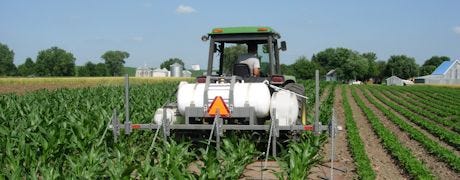December 18, 2012

Propane flame systems aren't a new technology in weed control. In fact, propane flame systems pre-date chemical and herbicide weed control methods. But now as weeds become increasingly resistant to these chemical methods propane flame technologies are re-emerging as an effective weed control method for an increasingly environmentally conscious culture.
New, more efficient, hooded propane flaming systems are being developed to better address the diverse weed control needs of growers seeking more sustainable, environmentally friendly, and cost-effective farming practices.

FLAMING WEEDS: Propane flame systems are an effective, environmentally friendly weed control alternative. New, more efficient hooded systems can meet the needs of growers seeking more sustainable weed control methods. Weeds can't become resistant to this method of control like they can with chemicals. New hooded systems are more effective than direct flame method.
Recognizing the advantages of hooded propane flaming systems, the Propane Education & Research Council, or PERC (a checkoff program that promotes propane safety, training, and the research and development of new propane technologies) partnered with the University of Nebraska-Lincoln to research and test the efficiency of hooded propane flaming technology. As a result of this research, Agricultural Flaming Innovations, based in Columbus, Neb., is now manufacturing and commercializing hooded flame systems in various row widths, including four-row and eight-row units.
Weeds can't become resistant to this method of control like they can with chemicals
Propane flaming systems kill weeds by concentrating heat from propane flames on weeds damaging the cell structure and causing weeds to wither and die. Weeds cannot become resistant to this method of weed control like they can with chemical methods. Another advantage of flame systems over their chemical counterparts is they allow farmers to return to their field immediately after a treatment -- something they can't do after herbicide application.
The improved technology of hooded propane systems featuring versatile torch design also offers additional efficiency benefits. Versatile torch design on new propane flame systems allows the technology to be used on a variety of crops, and multiple hood configurations enable flaming systems to be used throughout the growing season. For instance, the improved technology of split-hood configuration propane flame systems allows more mature crops to pass through the flame systems unharmed.~~~PAGE_BREAK_HERE~~~
"The versatility of the torch hood configurations allows for a more targeted weed control than previous propane flame system technology," says Mark Leitman, director of business development and marketing at PERC. "Torch hoods better focus flames and protect them from the environment so they can kill weeds more efficiently. For example, hooded propane flaming systems use about 9 gallons of propane per application, or about half as much energy as open flaming methods."
Flaming provides more than double the weed control levels compared to cultivating
During their studies on propane flame systems, UNL researchers found that hooded propane flaming systems, applied on row crops twice during a weed control season, result in weed control levels in corn and soybeans as high as 80% to 90%. This is more than double the weed control levels obtained using only cultivation.
The Organic Farming Research Foundation, or OFRF, has also touted the benefits of propane flaming for organic farming, calling the technology "as effective as chemical weed control treatments." Chemical-free flaming systems also preserve soil and water quality, prevent soil erosion and conserve water compared with other weed control methods. The OFRF notes that flaming systems don't leave chemical residues and are not vulnerable to weather.
"We're proud that PERC was involved in helping develop this worthwhile, environmentally friendly, weed control technology," Leitman says. "We believe farmers will be pleased with the results and cost savings they'll realize with flaming systems compared with traditional chemical-based weed and pest control methods."
Propane flame systems are re-emerging as an alternative to using herbicides
Including its use in flaming systems, propane is used on 40% of U.S. farms in a variety of applications. The clean-burning fuel is used on about 865,000 U.S. farms to run pumps and engines, heat buildings, and dry and process crops. In addition to these applications, propane flaming systems have also proved beneficial in dairy and poultry facilities. A Mississippi State University study found that propane flaming systems can reduce pathogens and moisture in the sand bedding of dairy facilities by up to 30%.
For more information on propane flaming systems, visit www.agpropane.com for benefits on flaming in agricultural operations. A new flame weed manual is also available for download here.
You May Also Like




